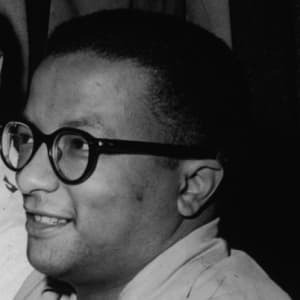
Herman Wouk
Herman Wouk is an internationally acclaimed Pulitzer Prize-winning Jewish American novelist and author of such works as The Caine Mutiny, The Winds of War, and War and Remembrance.
Synopsis
Herman Wouk is an internationally acclaimed Pulitzer Prize-winning Jewish American novelist and author of such works as The Caine Mutiny, The Winds of War, and War and Remembrance.
Early life
Herman Wouk was born on May 27, 1915 in the Bronx borough of New York City, the son of Abraham Isaac and Esther Levine Wouk, Jewish immigrants from Minsk, Russia (now Belarus). As a child, Wouk was frequently bullied on the rough streets of his neighborhood, but he found two safe refuges: his books and his home. When he was 13, his grandfather, Rabbi Mendel Leib Levin, arrived from Russia and took charge of Wouk's religious education. Herman Wouk once complained to his father about the amount of time he was expected to study the Talmud, a collection of rabbinic discussions, and his father replied, "I understand… but if I were on my deathbed, and I had breath to say one more thing to you, I would say 'Study the Talmud.'" Eventually Wouk took this advice to heart; Judaism would become integral to both his personal life and his career.
Herman Wouk went on to attend Columbia University, graduating in 1934 with a B.A. in comparative literature and philosophy. During his time at Columbia, he edited the college's humor magazine, the Jester, and wrote several variety shows. He immensely enjoyed working on comedic material. Upon graduation, he decided, "To hell with that noise [Judaism]. I'm going to be a funnyman." Wouk announced to his family that he wanted to be a comic writer. By 1936, he had been hired by comedian Fred Allen, who paid him $200 a week to write gags and sketches. Although the work was lucrative, Wouk came to find it unfulfilling. He missed the depth of his studies in Judaism.
World War II
Before long, World War II erupted in Europe and Asia. After the Japanese attacked Pearl Harbor on December 7, 1941, Wouk enlisted in the United States Navy, where he quickly distinguished himself as a superior officer and writer. Wouk later recalled his time in the navy as "the greatest experience of my life… I had known two worlds, the wise guys of Broadway and the wise guys of Columbia — two small worlds that sometimes take themselves for the whole world. In the Navy, I found out more than I ever had about people and about the United States. I had always been a word boy, and suddenly I had to cope with the peculiar, marvelous world of the machine." Although newly fascinated by technology, Wouk did not abandon his love of words; off-duty, he started work on his first novel, Aurora Dawn. During this period, Wouk also met Betty Brown, who later converted to Judaism in order to marry him in 1946, and went by the name of Sarah Wouk. The couple had three sons: Abraham (who died young), Nathaniel and Isaac.
The Caine Mutiny
Herman Wouk's Aurora Dawn was published in 1947. It became a Book of the Month Club selection, introducing thousands of readers across the country to his writing. Wouk took this success as a sign that he should write full-time. He subsequently composed novels and plays, and even worked on the screenplay for the film Slattery's Hurricane. Wouk's second novel failed to attract much attention, but his third, The Caine Mutiny, which had grown out of Wouk's own experiences in the Navy, won the Pulitzer Prize for fiction in 1952. In 1954, it was adapted into both a major motion picture, starring Humphrey Bogart, and a Broadway play, starring Henry Fonda, renamed The Caine Mutiny Court-Martial. Although his next novel, Marjorie Morningstar, did not enjoy the same success, it was turned into a 1958 movie starring Natalie Wood and Gene Kelly. Wouk's first work of nonfiction, This is My God: The Jewish Way of Life, was published in 1959 and aimed to explain Orthodox Judaism to Jews and non-Jews alike.
In the 1960s, Herman Wouk turned to historical topics, spending thirteen years researching World War II and the Holocaust to write The Winds of War (1971) and War and Remembrance (1978). He considered the works to be "the story I have to tell." Both were adapted into TV miniseries, for which Wouk wrote the screenplays and even made cameo acting appearances. "The films of The Caine Mutiny and Marjorie Morningstar always seemed to me mere thin skims of the story lines," Wouk said, "and I never did see a meager Hollywood caper called Youngblood Hawke, vaguely based on my 800-page novel. So it was that I opted for television, with its much broader time limits, for The Winds of War. Sixteen hours!"
Jewish Influences
Continuing in the vein of works inspired by history, Wouk wrote two novels based on real Israeli historical events, The Hope (1993) and The Glory (1994). These novels interweave real and fictional characters. A firm supporter of the state of Israel, Wouk once wrote, "Zionism is a single long action of lifesaving, of snatching great masses of people out of the path of sure extinction."
In 2008, Wouk turned over all of his journals to the Library of Congress. This was no small matter: Wouk had been keeping journals since the 1930s, and his total collection numbered more than 90 volumes. The institution then awarded him the very first Library of Congress Award for Lifetime Achievement in the Writing of Fiction.
Now nearly 100 years old, and faced with the death of his wife in 2011 due to a stroke, Wouk has still not given up writing. His latest work, The Language God Talks (2010), is partly based on conversations that Wouk had with the physicist Richard Feynmann, who once told Wouk that calculus "is the language God talks." The book explores the drama of human existence and the stage on which it takes place. Wouk explains, "This is the subject I've been thinking about my whole life." He wished for the work to be "a book telling of my religious faith in a frame of modern science, not necessarily a Big One, but a work I felt born to give the world. Not being a scientist at all, I was a fool to dream of accomplishing this, but novelists are fools whose dreams every now and then take form, see the light, and last."



